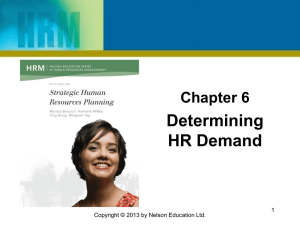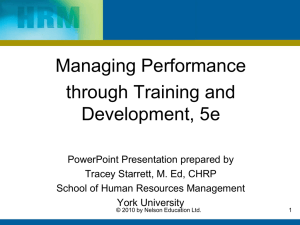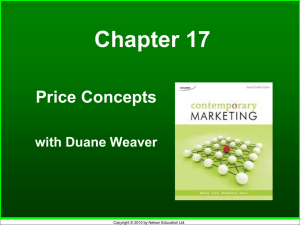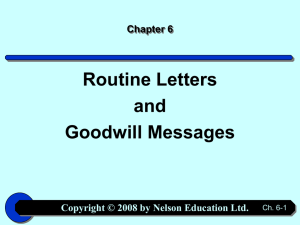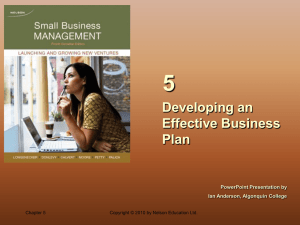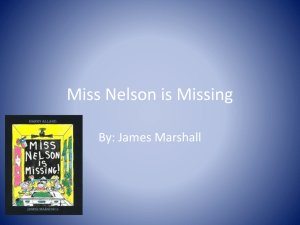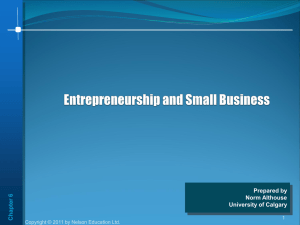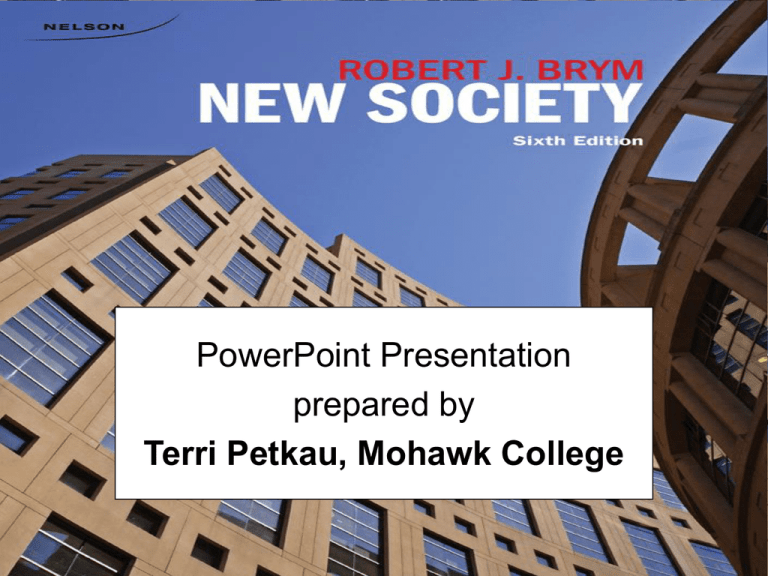
PowerPoint Presentation
prepared by
Terri Petkau, Mohawk College
CHAPTER TWENTY
Research Methods
Neil Guppy
INTRODUCTION
• Will examine:
Social research as scientific
research
Copyright © 2011 by Nelson Education Ltd
Minimizing bias in research
Methods and techniques of social
research
Future of social research*
20-3
SOCIAL RESEARCH
• Social research involves systematic
study of the social world
• Uses theoretically informed
questions
Copyright © 2011 by Nelson Education Ltd
• Integrates sound theory with careful
methods*
20-4
SCIENCE AS A
SOCIAL PRACTICE
• Science combines both subjectivity and
objectivity:
Subjectivity: Perceptions of reality that are filtered
by our personal values and expectations
Can lead to observer bias
Copyright © 2011 by Nelson Education Ltd
Objectivity: Attempt to minimize effect of personal
bias on research results, or idea of impartiality
• Research methods cannot eliminate bias but seek
to minimize its impact*
20-5
MINIMIZING BIAS IN
SOCIAL SCIENCE
• Scientific practices minimize bias by:
Subjecting research findings to rigorous
scrutiny by scientific community
Copyright © 2011 by Nelson Education Ltd
Applying skeptical reasoning to research
findings
• Does not negate central need though for
subjectivity in change and innovation*
20-6
SCIENTIFIC THINKING
• Scientific thinking starts with uncertainty; i.e., a
hypothesis (question, hunch, or well-conceived
conjecture about how the world works) that must
be testable
Should include possibility of refuting scientific
claim
Copyright © 2011 by Nelson Education Ltd
• Science is not merely observation of facts but
requires interpretation of the collection of facts
• In science, need to confront problem of
induction:
No matter how many observations you make,
you cannot infer your next observation*
20-7
NATURAL SCIENCES VS.
SOCIAL SCIENCES
• Both natural sciences and social sciences
use the scientific method:
Set of practices or procedures for testing
knowledge claims
Copyright © 2011 by Nelson Education Ltd
• But social sciences have different subject
matter:
Study meaningful action: Activities that
arise from intentionality and are meaningful
to people involved*
20-8
METHODS OF SOCIAL
RESEARCH: 1. EXPLANATION
• Explanation is necessary to show how or why a
cause has a certain effect
Causation involves relationship between two
variables where change in one variable produces
change or variation in second variable
Multiple causes are involved in almost every
social-scientific explanation
Copyright © 2011 by Nelson Education Ltd
• Need to guard against assuming correlation
equates to causation because correlation can be
spurious:
Incorrect inference about causal relations between
variables*
20-9
AN EXAMPLE TO ILLUSTRATE
THAT CORRELATION DOES
NOT PROVE CAUSATION
Copyright © 2011 by Nelson Education Ltd
20-10
METHODS OF SOCIAL RESEARCH:
2. UNDERSTANDING
Copyright © 2011 by Nelson Education Ltd
• Explanations must address not just observations
but the meaning of human activity
Determining meaning requires understanding
Understanding is facilitated by “taking the role of
the other,” which involves:
Imagining yourself in another person’s role in
order to appreciate and understand their point of
view; i.e., their “definition of the situation”
• Together, understanding and explanation
contribute to knowledge that often leads to social
change*
20-11
TECHNIQUES OF SOCIAL
RESEARCH
•
Sociologists have developed a variety of
techniques to gather evidence
•
Three important techniques include:
1. Experiments
Copyright © 2011 by Nelson Education Ltd
2. Survey research
3. Observational studies*
20-12
1. EXPERIMENTS:
TERMINOLOGY
• Variable: Something that varies, or an attribute
or event that can take on more than one value
(e.g., unemployment rates, age, sex)
Copyright © 2011 by Nelson Education Ltd
• Independent variable: Variable presumed to
affect or influence other variables; is the causal
variable
• Dependent variable: Variable presumed to
depend on or be caused by one or more other
variables; is the effect or outcome in a causeeffect relationship*
20-13
1. EXPERIMENTS
• Experiment: Controlled test of causal effects of a
particular variable or set of variables on a
dependent (outcome) variable
• Is used to test hypothesis: Unverified but
testable knowledge claim, derived from a theory,
about a relationship between two variables
Copyright © 2011 by Nelson Education Ltd
• Allows researchers to isolate presumed causes
more precisely than any other method and to
test hypothesis*
20-14
1. EXPERIMENTS
• Central to experimental design is randomization:
Procedure used to assign test subjects to
experimental conditions on basis of chance
Copyright © 2011 by Nelson Education Ltd
• Randomization enhances external validity, which
includes:
Generalizability of a particular finding from the
study group to a larger population
Relevance of conclusions for a larger population,
or
Ability to infer study results are representative of
processes operating for a broader population*
20-15
1. EXPERIMENTS
• Field experiments are used to avoid some of
problems of laboratory experiments
Are conducted in a natural setting, thereby
reducing problems of artificiality
Copyright © 2011 by Nelson Education Ltd
• Limitations include:
Potential for Hawthorne effect: Changes in
people’s behaviour caused by awareness of
being studied
Ethical issues at both individual and community
levels*
20-16
2. SURVEY RESEARCH
• Primary method of collecting social science
evidence is the survey:
Asking identical questions of a sample of people
Allows for systematic comparison of answers from a
large sample
Copyright © 2011 by Nelson Education Ltd
• To obtain survey participants and ensure they are
representative of larger population from which they
are drawn, researchers use random sampling:
Samples selected by using rules of chance or
probability
Researchers then able to generalize results to
larger population*
20-17
2. SURVEY RESEARCH
• Survey questions posed either through selfadministered questionnaires (where people
record own answers to preset questions) or
personal interviews (asking people questions in
person or over phone)
Copyright © 2011 by Nelson Education Ltd
• When conducting surveys, is important to guard
against assuming that people:
Understand what they are being asked
Know the answer to questions
Will admit the answer to themselves
Will give valid answers to others*
20-18
2. SURVEY RESEARCH
• Confidence in findings also is based on the
following two measures:
Validity: Relevance or accuracy of measurement
in relation to the theoretical concept that is being
measured (i.e., does the survey measure what it
set out to measure?)
Copyright © 2011 by Nelson Education Ltd
Reliability: Consistency of measurements, and
ability to reproduce same measurements on
repeated occasions*
20-19
3. OBSERVATIONAL
STUDIES
Copyright © 2011 by Nelson Education Ltd
• Participant observation: Study of
social life that involves participation
of the researcher, to varying
degrees, in activities of the group
under investigation
Sociologists can act as outside
observers or as participant observers
(or insiders)*
20-20
3. OBSERVATIONAL
STUDIES
• Researchers attempt to provide
detailed “insider’s” account of a
particular way of life or cultural
system (i.e., ethnography)
Copyright © 2011 by Nelson Education Ltd
Achieved through researchers using
Verstehen (or understanding) as
they take note of subjective
meanings people assign to their own
behaviour*
20-21
3. OBSERVATIONAL
STUDIES
• Advantage of observational research
is that it allows researchers to see
what people actually do, rather than
rely on reports of what people say
they do (i.e., as in survey research)
Copyright © 2011 by Nelson Education Ltd
• Observational studies also useful for
understanding meaning that actions
have for people being studied*
20-22
3. OBSERVATIONAL
STUDIES
• Problems with observation studies include:
External validity: Samples usually small, so difficult
to generalize findings to the larger population
Presence of researcher: Subjects may change
behaviour due to presence of observer (i.e.,
Hawthorne effect)
Copyright © 2011 by Nelson Education Ltd
Ethnocentrism: Researcher may impose own
values or worldview on study’s subject matter
Bias of focus: Possibility that responses and
findings generated because of researcher’s biased
focus*
20-23
OTHER RESEARCH
METHODS
Copyright © 2011 by Nelson Education Ltd
i. Historical sociology:
Answers sociological questions by
examining historical change as
evidence of significant social
processes
Uses historical evidence to test
theories of social change
ii. Documentary analysis:
Examine official documents…*
20-24
OTHER RESEARCH
METHODS
iii. Use of official statistics:
Sociologists use official statistics
collected by governments in censuses,
labour force surveys, police reports,
etc., to gain valuable information
Copyright © 2011 by Nelson Education Ltd
Data not regarded as “objective facts”
though and are interpreted with caution
given concerns about validity and
changes in practices of those collecting
statistics*
20-25
ANALYSIS OF NUMERICAL
DATA
• To aid summarizing information and interpreting
patterns in numerical data, social scientists
routinely rely on statistical techniques
Copyright © 2011 by Nelson Education Ltd
• Numerical data can be analyzed using a
contingency table (or cross-tabulation), which
simultaneously classifies an individual’s scores
on two or more variables
The category into which a person is placed in
terms of the dependent variable is contingent on
the category a person occupies on the
independent variable*
20-26
ANALYSIS OF NUMERICAL
DATA
• A better understanding of patterns
occurs when data is standardized;
i.e., converted into percentages
Copyright © 2011 by Nelson Education Ltd
• The strength of association between
two variables in a contingency table
can be measured by the percentage
difference between columns*
20-27
THE RELATIONSHIP BETWEEN
LEVEL OF EDUCATION AND
INDIVIDUAL INCOME FOR PEOPLE
AGED 25–34, 2003
Copyright © 2011 by Nelson Education Ltd
20-28
THE RELATIONSHIP BETWEEN LEVEL OF
EDUCATION, INDIVIDUAL INCOME, AND
GENDER FOR PEOPLE AGED 25–34, 2003
Copyright © 2011 by Nelson Education Ltd
20-29
HYPOTHETICAL RELATIONSHIP
BETWEEN EMPLOYMENT INCOME
AND YEARS OF SCHOOLING
Copyright © 2011 by Nelson Education Ltd
20-30
FUTURE OF SOCIAL
RESEARCH
• Today, society is faced with pressing social
issues, including starvation, environmental
degradation, terrorism, social injustice, etc.
Copyright © 2011 by Nelson Education Ltd
• Solutions require adequate explanations and
understandings in terms of how these problems
not only arise but persist
• Sociological research can contribute to this
understanding and inform effective policy
solutions that benefit all people**
20-31




